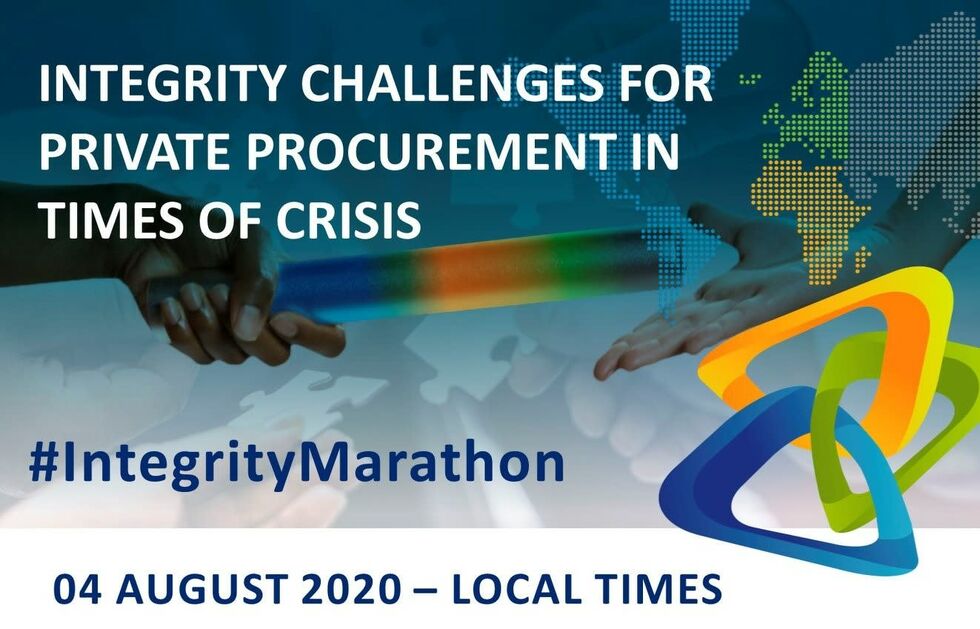Integrity Marathon 2020: Compliance and Transparency are Non-Negotiable
04.08.2020
Global, online

A marathon covers the official distance of 42.195 kilometres. Some ultramarathons have even the double or triple length. The first Integrity Marathon in the history of the Alliance for Integrity goes beyond these standards. Starting in Asia, with stopovers in Europe and Africa, and crossing the finish line in Latin America, we have completed a total of 16,835 kilometres, bringing together more than 1,000 participants from 34 countries. In seven interactive sessions experts from the public and private sectors, as well as civil society discussed pertinent issues on the overarching topic of Integrity Challenges for Private Procurement in Times of Crisis.
The topic recently gained prominence in the public discourse, as procurement departments have the daunting task of making purchasing decisions in unprecedent conditions. In normal situations, companies and governments have defined processes designed to promote fair and open competition for their businesses, minimising risks such as exposure to fraud and collusion. However, the unpredictability, urgency, the threat to health, and the need for new supplies during this crisis, increases the risks of corruption and non-compliance. Over a time span of almost 24 hours, panellist of each session passed on the baton and carried the conversation on practical and technical knowhow in dealing with such situations around the globe.
The virtual dialogue highlighted a number of challenges that the regions are currently facing in relation to the changing business environment and working situation due to Covid-19 regulations. These include a decline in transparency that comes with people working from home. Another important point that was made, was the pressure being put on smaller companies in the supply chain in the rapidly changing market, which might result in compliance being seen as a burden, rather than a tool for sustainable growth.
In order to address these new challenges, the panellists shared a selection of best practices, such as the importance of involving compliance departments in the procurement process as early as possible. In addition, they emphasised the need of using digital tools available to complete due diligence and approval processes efficiently. A common aspect of many of the experiences mentioned, was the relevance of collective action and cooperation between all actors involved in the procurement process. A good way to ensure this, is for companies to set up a steering committee consisting of representatives from all stakeholders involved. It is also important to support smaller companies and to focus on strengthening partnerships to develop emergency procurement processes to be better prepared for future crises. The key message in all the discussions was that compliance and transparency are non-negotiable, especially in times of crises.
One of the most important tools for fighting corruption and for encouraging integrity was found to be transparency: by informing and educating the public, governments and businesses are being held accountable. Having holistic due diligence processes, which are always based on the four-eye principle and include not only anti-corruption, but also human rights, fraud, related parties and financial analysis was a key recommendation shared by the panellists. In times of crises due diligence processes must be made easier and more agile.
Another important lesson learnt which was shared by the speakers around the globe was that knowing potential risks is crucial to start with. In order to achieve this knowledge, risk assessment and analysis should be a priority for businesses. In order to implement follow-up measures, employees must be sufficiently trained to recognise risks and be able to deal with them accordingly. The panellists also agreed on the point that compliance and integrity not only have to be enforced by the companies themselves but must be upheld in the entire supply chain and the wider economic system. Cooperation, collaboration and information sharing within and across companies are key factors in fighting corruption.
One of the participants from Mexico expressed: “I believe the multiplying value of these events is very important so that “real life” messages reach and convince others that doing business correctly and ethically is totally possible.” The panel discussion from Brazil drew further attention to the fact that the fight against corruption should be seen in the wider context of other related issues, such as human rights, while the speakers from Ghana and Nigeria made the point that it is important to empower people to report corruption and to create a culture that allows to make mistakes and learn from them.
The Integrity Marathon was received well around the world, with one participant from Argentina describing the virtual dialogue as “a masterclass about compliance and reality”. Participants from Indonesia agreed that, the topics discussed were extremely relevant for their daily business and that the information was clear and helpful for them. The marathon was successful in bringing together experts from around the world, which allowed them to share their knowledge, not only with their peers but with audiences from 34 countries. Thus, showing that unity, support and cooperation is at the heart of the global fight against corruption, now even more than ever. The key takeaways from the discussions can be downloaded here.
Author: Miriam Trinker





